
Microsoft BizTalk Server still is the most popular middleware platform for on-premise enterprise application integration. Given that it is a Microsoft product for integration, it makes sense why it is the most widely used middleware system. Since over 81% of Fortune 100 firms and several other government organisations utilise BizTalk for data integration, BizTalk has a bright future, according to the data.
In recent times, there have been a lot of buzzes running on social media about the future of BizTalk Server. We are all aware that Microsoft is even started pushing their customers to Azure Serverless technologies. Also, there were few competitors available in the market for developing integration solutions. Thus, it gave us a strike to analyse the future of BizTalk Server.
Does 20 years of legacy end soon? Join our hands to explore the future of BizTalk Server in this blog post.
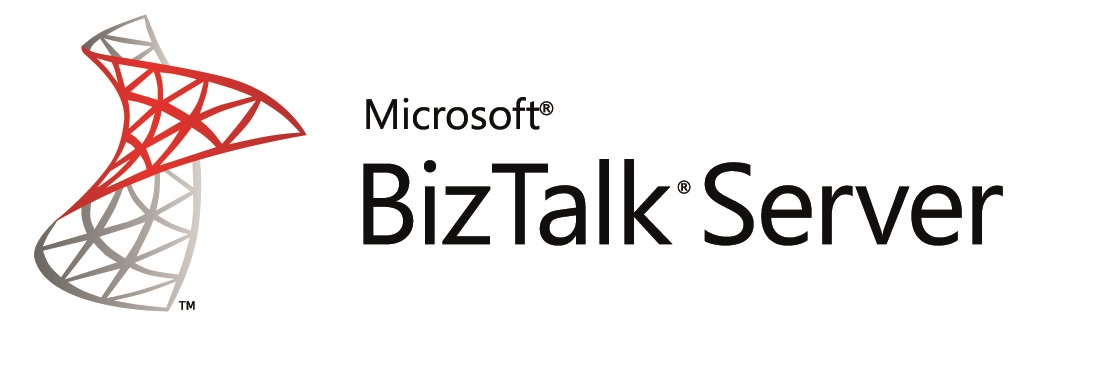
Let us take it from the basics.
Microsoft BizTalk Server is a middleware product from Microsoft that helps to connect various systems together. Also, it is often described as the centre point of enterprise integration applications and is, therefore, essential to business process automation, business-to-business communications, message brokering, and business activity monitoring.
The Component Object Model (COM) technology, which allowed software components to interact with one another, served as the inspiration for BizTalk Server.
Later, innovative technologies were added, such as COM+, DCOM, Windows Runtime, ActiveX, OLE, etc. On COM technology, each of these technologies was built.
In the decade before the launch of BizTalk Server, electronic digital data transport was becoming increasingly conceivable. BizTalk Server 2000 was the name of the initial release of the BizTalk Server. The goal of the release of BizTalk Server was to make it a play for IT professionals by offering integration services across software entities.
Since it was initially released over two decades ago, Microsoft consistently released an updated version every 2-4 years once for the past 20 years (2000, 2002, 2004, 2006, 2006 R2, 2009, 2010, 2013, 2013 R2, 2016 and now 2020). BizTalk Server has advanced significantly. Through BizTalk PaaS Azure Logic Apps, technology has moved away from servers and towards Azure serverless.
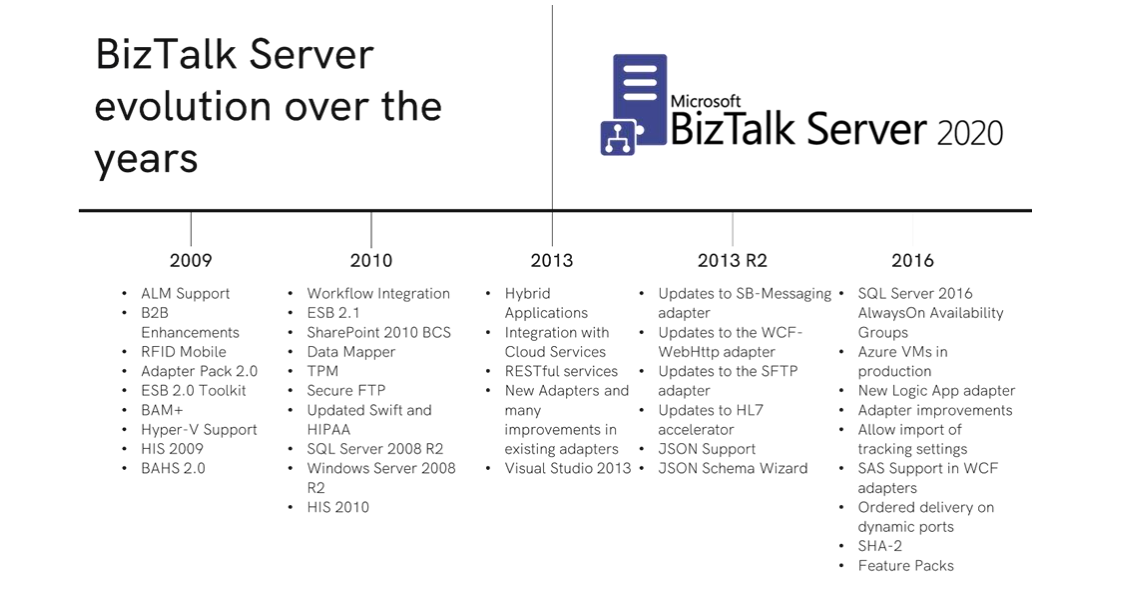
Since the first version of BizTalk Server was introduced in the year 2000, it got stable and feature-rich since 2006 and got matured over the years with every release and cumulative updates. Since the last couple of releases, Microsoft focused on
Feature packs were introduced from BizTalk Server 2016 with new and non-compatibility features like,
The recent version of BizTalk Server is 2020, it is not just a simple software update, but it is a momentous change and the beginning of a new era. In the history of software, few products have lasted for more than two decades without breaking down.
With each new BizTalk release, changes are made that benefit the hybrid integration situation. Support for more recent platforms, including Visual Studio 2019, Windows Server 2016 and 2019, Windows 10, SQL Server 2016 SP2, 2017 and 2019, Office 2016 and 2019, and a new set of adapters for Azure Services, including Logic Apps, Service Bus, Office 365, etc., are the most crucial.
A 10-year commitment to product support is made by Microsoft when a server product like BizTalk Server is released. You will have 5 years of normal support and an additional 5 years of extended service to run your production systems without discomfort or end-of-life concerns.
In Version 2020, mainstream support has been provided for 8 years, which we have not seen before in the BizTalk Server product lifecycle.
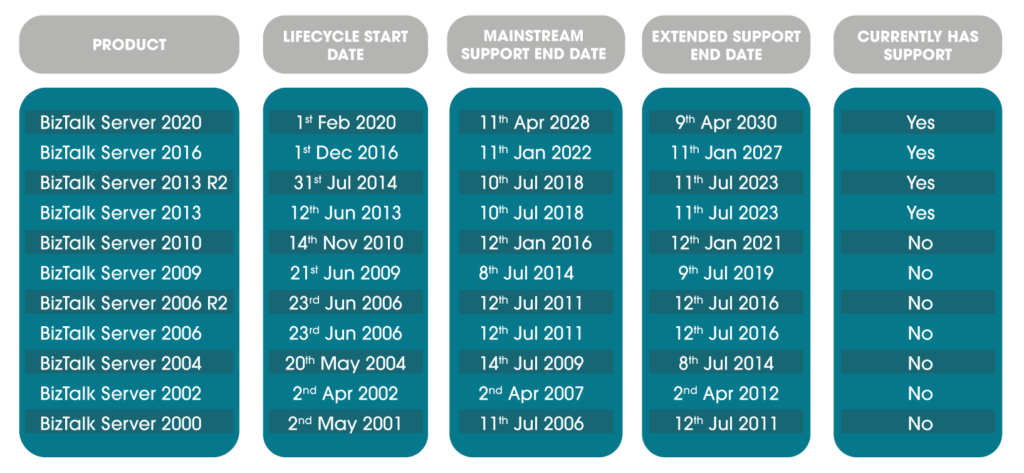
In the past, only skilled developers and architects were capable of architecting and creating integrating solutions. Not all developers were able to create a workable integration solution since the tools and abilities were regarded as specialised. These days, you may create integration solutions with a few clicks and little to no experience using the new low-code integration platforms that are readily available.
The Azure Integration Services are a group of Azure platforms that let you create integration solutions. These platforms include Logic Apps, API (Application Programming Interface) Management, Service Bus, and Event Grid, and are supplemented by Azure Functions and Azure Monitor.
The EIP (Enterprise Integration Pack) uses similar ideas to Microsoft BizTalk Server and Azure BizTalk Services, making it simple to leverage B2B capabilities. The EIP is structurally built on integration accounts, which is a key distinction. These accounts are Azure cloud-based containers that make it easier to store, manage, and use B2B communication artifacts including trade partners, contracts, maps, schemas, certificates, and more.
By combining these artifacts with Azure Logic Apps’ 400+ built-in operations and managed connections, you can create B2B workflows and integration solutions that use cloud services like Azure, Microsoft, and other software-as-a-service (SaaS) applications, on-premises systems, and custom apps.
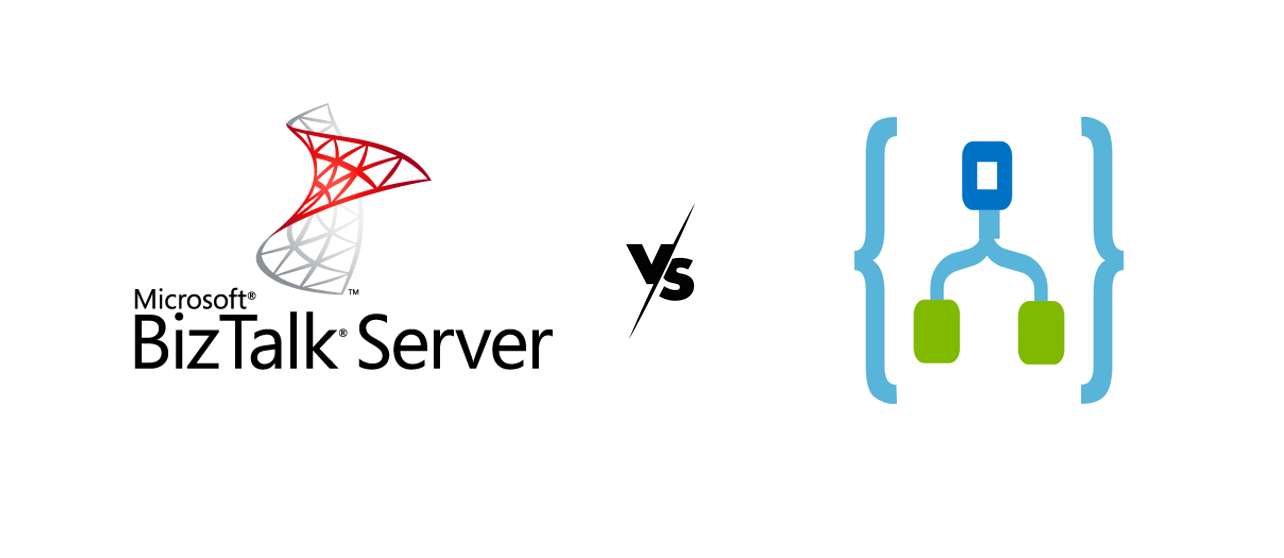
There is no way to compare the two. Like contrasting a pizza and a burger. While Azure is a platform for cloud services, BizTalk Server is a Microsoft solution for corporate automation and integration. Like an on-premises data centre or configuration, BizTalk may be deployed and configured within Virtual Machines on Azure IaaS (Infrastructure as a Service) and function as needed.
Developers may wonder if Logic Apps is a replacement for BizTalk, which also can be used to integrate various applications, help automate business flow, and assist B2B organizations to function in adherence to industry standards. Even though Logic Apps may be modified with connectors for on-premises apps, LOB, etc., BizTalk focuses mostly on on-premises connectivity whereas Logic Apps addresses integration needs via Software as a Service (SaaS).
To put it another way, BizTalk is a product that you must purchase, install, write applications for, and manage both (the applications and the BizTalk Server). On the other hand, Microsoft-managed Logic Apps is a Platform as a Service (PaaS) that you pay for as you go.
There is no doubt that in recent times Logic apps are on among the best platforms to create automated workflows with business app integration. Although there are many advantages to Azure while using Logic Apps, there are a few limitations that we must consider while migrating to Azure from BizTalk Server.
When you compare it with the BizTalk development and Logic Apps. The Logic Apps is a bit more difficult to visualize the business flow.
The user interface of the Azure logic Apps or designer to configure the actions should be improved. Like all other projects, built in Visual Studio Code or Azure Logic Apps, planning and mapping your project out is essential as learning way is hard. In Logic Apps you can relatively easily drag and drop where you want the required method to be but sometimes this is not possible.
Should a method further down require the output of the method you wish to move, the system will not allow you to move the method in question. This can lead to a lot of strings pulling and ultimately, having to delete everything you created after the method you wish to move and then rebuilding it all again in the correct location.
If any of the business solutions is failed, the troubleshooting process to find out why the process failed can be improved.
It is one of the advantages that there is no development knowledge needed to build an end-to-end integration of all the apps and data. At the same time, it is not easy to troubleshoot the failure since a BizTalk developer/Administrator is dedicated.
More advanced action options can be added to the workflow templates As of now the application Insights is attached to a Logic Apps Standard App instead of each individual workflow, mixing workflows that are relevant to that end-to-end process with other workflows can create noise, making it much harder to find the information required.
A shift in the amount of processing power accessible to the firm is one of the major problems. Your computer capacity might not transfer with you, if you switch from on-premises servers to the cloud.
“Any technology is evolving; you need to be prepared to adapt to changes.”
It is not a simple choice to make if you are looking for a middleware platform. It will never be simple to compare and evaluate everything, since there are tons of products on the market, each of which requires months of learning to comprehend the capabilities.
The product’s lengthy history is a crucial decision-making consideration. And as everyone knows, Microsoft’s future focus on the cloud makes it an ideal choice for any firm to stake a claim on this middleware platform.
Every decade, technology evolves. There are only two options available now:
With digital transformation, it is well possible that your organization’s IT future lies with the cloud. The workloads, business processes, and applications may easily be refactored or moved to the cloud and are ideal for cloud computing.
Keeping in mind that Microsoft tries to move their customers to the cloud.
As we have previously mentioned, cloud integration was the logical next step after Microsoft’s success in the integration market over the last 20 years with BizTalk.
After a few failed attempts using the Azure Integration strategy, we now have Azure Integration Services. Thanks to Microsoft’s gathering of a team of seasoned and competent integration specialists who gave direction to an initially tumultuous approach. With the growing functionality that Azure Integration Services provides us with, more companies adopt a cloud-first approach to their IT Architecture.
With this, a question remains: How can businesses who have spent millions on BizTalk-based integration platforms transition to the cloud?
Here is the most awaiting part: BizTalk Server will keep its place for the next few more years. We are aware that the Azure integration services are still growing, it must continue to grow and evolve when you compare it with BizTalk Server.
So, it might be better we still bet on a successful product and keep an eye on the future.
As mentioned earlier, we should not compare the two. But there are some upper hands in BizTalk Server over Azure Serverless.
Since BizTalk Server is a matured product, you can still find the expertise in the integration ground.
Due to the availability of out-of-box adapters, it is easy to integrate any applications be it SQL, Oracle, Informix, MSMQ, FILE, FTP, SFTP, MQSC, TCP (Transport Control Protocol), etc.
Since BizTalk Server is an on-premises application it supports both on-premises and cloud support. Whereas Azure expects everything in its bay.
Those who are using BizTalk Server for a decade and when you move to Azure, the first thing you will notice is a lack of visibility. You will miss BAM (Business Activity Monitoring) and BRE (Business Rule Engine).
For BAM, you can still find some external tools like Atomic Scope and Serverless360 to view the activity. Also for BRE, no out-of-the-box solutions are available, and you would need to rely on technologies like Liquid templates, NRules, or third-party products.
We still have clients who are worried about their data security in this digital era. Even though, cloud services provide high security, still customers were hesitant to migrate their data.
“BizTalk Server is still the king in this playground.”
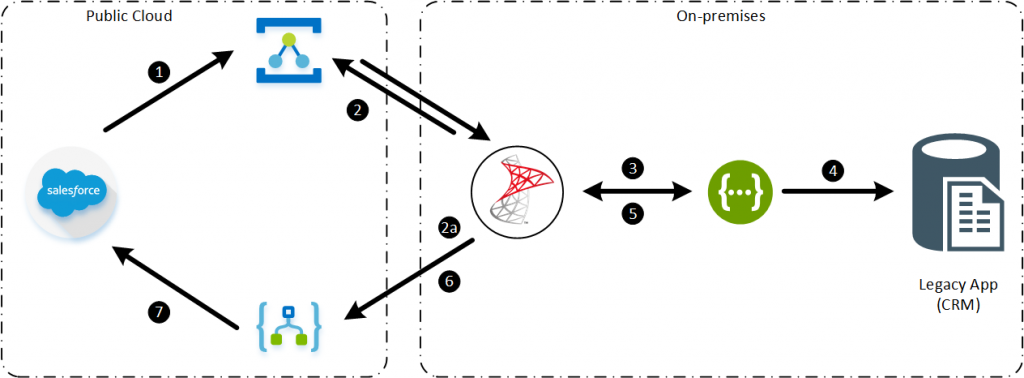
Microsoft owes it to its customers to provide world-class integration solutions that can be used both on-premises and in the cloud. We think that with the current expansion of the hybrid tale, this is becoming even more crucial. Bridging the gap between these goods has been significant.
“Hybrid is the future of BizTalk Server”
BizTalk Server has the breadth and depth to provide varied integration solutions. With the advent of Azure, BizTalk Server functionality is further enhanced while at the same time the cost of operations and maintenance is reduced.
We have talked to some clients about what their migration strategies are for moving their BizTalk on-premises integration platforms to AIS (Azure Integration Services) and they have said they do not have a cloud strategy and plan to remain on-premises.
However, if Microsoft BizTalk Server 2020 ends up being the last version or we expect one last version from Microsoft, then based on the 10-year life cycle support approach Microsoft adopts for their products, time is ticking for those companies who choose not to migrate.
You do not have to migrate but running critical production systems on unsupported software is not a sensible approach – although we do know customers who are still on BizTalk Server 2009!
We think that we will still see a supported version of BizTalk for many years to come, Microsoft does not have a reputation for leaving their loyal customers high and dry. Having said that, it would not be too soon for companies to seriously consider migrating to Azure as there are many other benefits the cloud has to offer.
Microsoft will retire the BizTalk Server, not shortly, but definitely. If you look carefully at how Microsoft is positioning BizTalk Server 2020, it is positioning it as a hub/window between the legacy and modern world.
Having said that before, for the past ten years, the enterprise world has always been a hybrid environment, where you can mix and match the tech stack that is appropriate for your company between on-premises and cloud-based solutions.
BizTalk360 is a product that provides advanced monitoring and management capabilities for Microsoft BizTalk Server. Even though BizTalk Server comes with a management console, which does an excellent job, it misses a few things. For example, it lacks advanced capabilities like a web-based management console, advanced user security features, automated monitoring, etc.
Monitoring the BizTalk Server platform is crucial, currently BizTalk Server customers need to rely on SCOM (System Center Operations Management). Although SCOM management packs for BizTalk Server is up to date to BizTalk Server 2020, setting up useful monitoring as not an easy task.
Hence you can try BizTalk360. Since it is a widely used product in the market with over 650 enterprise customers in 40+ countries across the world. You can get a 30 days trial version of BizTalk360 and explore the product yourself or arrange for a personal demo of the product.